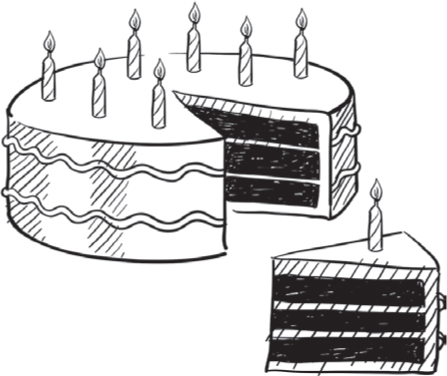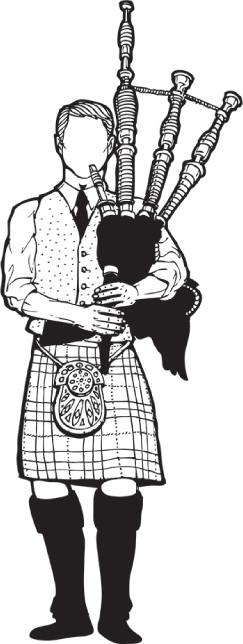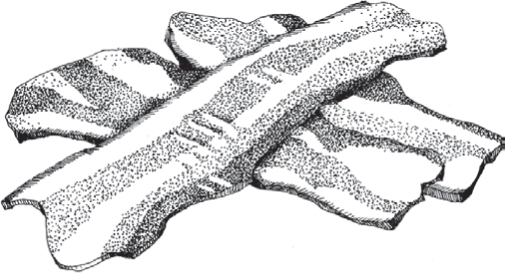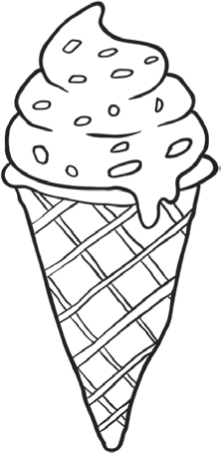![]()
MEANING: an excellent new idea or invention
IN CONTEXT: This new computer software is the best thing since sliced bread.

Best thing since sliced bread began, perhaps unsurprisingly, with the bread business. Otto Frederick Rohwedder of Iowa invented the first bread-slicing machine in 1928. The first commercial use of that machine was by the Chillicothe Baking Company in Missouri. Their product was called Kleen Maid Sliced Bread and was advertised in a local newspaper as “the greatest forward step in the baking industry since bread was wrapped.” The bread was an instant success and other bakeries started using the machine, advertising it heavily. Sliced bread became a talking point throughout the country and it is thought that the original marketing slogan soon developed into the popular expression that is used today.
![]()
MEANING: to make a joke about someone or to make someone look stupid
IN CONTEXT: They’re always taking the piss out of him because he’s an ABBA fan.
Take the piss is an expression with bizarre origins. In ancient Siberia, the shamans used a hallucinogenic mushroom in their spiritual ceremonies. Called the Amanita muscaria, the sacred mushroom was extremely potent and the human body was unable to withstand its toxins. To get around this obstacle, the shamans would feed large quantities of the mushroom to their reindeer, then wait for the animals to urinate in the snow. The shamans would then eat the urine-soaked snow and become high and nonsensical, without any toxic effects.
![]()
MEANING: a hardship or rough treatment
IN CONTEXT: He worked eighty hours in the first week of his new job. They really put him through the mill.
Put through the mill derives from the flour-making process in medieval England. Before electricity was invented, classical mills were usually powered by water, which turned a large wheel. This turned two heavy circular stones, which were laid on top of each other. Cereal seeds were fed through the top stone and they would be ground finely to produce flour. By the 1800s, being put through the mill came to refer to a person undergoing a hardship, similar to the process of being ground down like a grain in a mill.
![]()
MEANING: to raise a topic with someone, often in awkward circumstances
IN CONTEXT: I hate to be the one to broach this with you, but you have lettuce in your teeth.
To broach a subject began in the alehouses of London. The word “broach” derives from the Old French word broche, meaning “a pointed weapon or implement.” In order to draw beer from a barrel, a publican would hammer a wooden peg into the bottom of the barrel, which allowed a tap to be inserted from which the beer could then start to flow. This wooden peg was called a broach and the technique was known as “broaching the barrel.” Later, this phrase evolved to refer to the opening up of any new subject of conversation.
![]()
MEANING: to achieve something; to do something outrageous
IN CONTEXT: I worked hard all day then my boss questioned what I’d been doing. That really takes the cake.

Sometimes said ironically, take the cake originated with the days of slavery in America during the 19th century. At parties held by wealthy white landowners, it was a tradition for married slaves to walk in a procession around a cake in a form of competition. The slaves would be judged, and the couple who was considered the most graceful would get to take the cake as a prize. This is also the origin of the expressions cake walk and piece of cake, both of which mean “something easily accomplished,” as while these tasks were demeaning, the competition required very little effort.
![]()
MEANING: an alcoholic drink intended to cure a hangover
IN CONTEXT: Phil felt so bad the day after the party that his only hope was to have a hair of the dog.
Hair of the dog is a contraction of the full expression “the hair of the dog that bit you.” Its origin lies in medieval English medicine. It was believed that if someone was bitten by a rabid dog, any ill effects would be cured by rubbing the same dog’s hair into the infected wound, which would then heal. Despite the obvious risk of being bitten again while acquiring the hair, this practice persisted for years. Eventually it came to be used in relation to people having a couple of drinks to cure a hangover, a remedy that often has temporary success.
![]()
MEANING: to not perform up to expectations or the required standard
IN CONTEXT: We need a better pitcher. This one just doesn’t cut the mustard.
Doesn’t cut the mustard is an expression with many potential origins. Some say it is a corruption of the military phrase “pass muster,” meaning “pass an inspection,” but the likely beginnings actually involve the mustard plant. The mustard plant grows very close to the ground and has a particularly tough and stringy stem. They grow densely together and are one of the hardest plants to reap. Before the advent of machinery, farmers would have to bend low all day or even work on their knees to harvest the plant. Once a worker became too old and weak to carry out the arduous task, it was said that he doesn’t cut the mustard. The phrase was being used figuratively in America by the end of the 19th century.
![]()
MEANING: extremely hot, usually referring to food
IN CONTEXT: Don’t touch the pie yet. It’s just come out of the oven and is piping hot.

Some believe that piping hot owes its beginnings to ceremonial meals in Scotland, where dishes are often brought to the table while bagpipes are playing—they are “piped in.” However, this is not the origin. It actually derives from the whistling or sizzling noise made by steam as it escapes from very hot food or the spout of a boiling kettle. This sound is similar to that of high-pitched pipe organs in large churches. The first written recording of the expression was by the English writer Geoffrey Chaucer in his 1386 work Canterbury Tales, which referred to “wafers piping hot out of the gleed,” the gleed being the fire.
![]()
MEANING: to quit something abruptly
IN CONTEXT: David found it difficult to stop drinking gradually, so he decided to go cold turkey.
Go cold turkey began with the symptoms that people exhibit during drug withdrawal. When someone suddenly stops taking drugs after a prolonged use, the addict’s blood flows to the internal organs as a survival tactic. This leaves the skin hard and pale with goosebumps all over, so it resembles a plucked, cold turkey. The phrase was used in the medical sense from as early as the 1920s and became a figurative expression about quitting anything—from drugs, to alcohol, to chocolate—by the 1950s.
![]()
MEANING: a ritual in which a drink is taken in someone’s honor
IN CONTEXT: The father of the bride proposed a toast to the new couple.
Propose a toast began in the 12th century. The quality of wine at the time was not high and varied considerably. In order to soak up some of the acidity and improve the flavor, a piece of spiced toast was placed in a wine jug, or small pieces were placed in wine glasses. By the 17th century in England, the practice of proposing a toast to someone emerged. The glass would be raised, as it is today, and it was usually a lady who was toasted. The idea was that she became a figurative piece of toast that flavored the wine.
![]()
MEANING: become ruined; no longer of any use
IN CONTEXT: This beer is five years old and it can’t be drunk. It’s all gone to pot.
Gone to pot originated in the 16th century and has culinary beginnings. Before refrigeration existed, meat did not last as long as it does today, and after a couple of days would harden and become inedible. Such meat that was on the verge of spoiling would be chopped up into small pieces and cooked in a pot to make stew. Meat that was used in this way was referred to as having gone to pot. The first recorded usage of the expression was by William Tyndale, the English scholar. In his 1530 work An Answer Unto Sir Thomas More’s Dialogue, he wrote, “Then goeth a part of ye little flocke to pot, and the rest scatter.”
Don’t Teach Your Grandmother to Suck Eggs
![]()
MEANING: don’t offer advice to a more experienced person
IN CONTEXT: I’ve been fixing cars since before you were born. Don’t teach your grandmother to suck eggs.
Don’t teach your grandmother to suck eggs began hundreds of years ago before advanced dentistry techniques were common. In those days, dental hygiene was not very good and dentures were expensive. When a poor person got old and their teeth fell out, they were left with only gums. One of the easiest foods to eat without teeth was a hard-boiled egg that the person could suck down. It was often grandparents who were seen doing this and, through years of practice, they became experts at eating eggs this way. The phrase was first recorded in John Stevens’ 1707 translation of the collected comedies of the Spanish playwright Francisco de Quevedo, which contained the line, “You would have me teach my Grandame to suck Eggs.”
![]()
MEANING: to earn money for one’s family; to be successful
IN CONTEXT: I had been at my job for ten years, but after my promotion I finally started bringing home the bacon.

Bring home the bacon began in the village of Dunmow in Essex, England, in the year 1104. In that year, a noblewoman named Juga offered a side of bacon, known as a flitch, to any married couple in England who could honestly say that they had lived in complete marital harmony without a cross word being spoken for the preceding year and one day. The tradition became known as the Dunmow Flitch Trials. The Trials are still held every four years, the candidates having to prove their worth before a jury of twelve. If successful, they bring home the bacon. In over 500 years, there have only been eight winners.
![]()
MEANING: to act submissively in admitting an error, often in humiliation
IN CONTEXT: I had been so adamant, but when I was proven to be wrong I had to eat humble pie and admit my mistake.
To eat humble pie has rather distasteful culinary origins. In medieval feasts, there was a definite hierarchy with the food. The lord of the manor and his guests from the upper echelon of society were served the finest cuts of meat, usually venison. Known at the time as “umbles,” the reviled offal and entrails would be baked in a pie. Diners who were out of favor or thought to be of a lower class would be served the umble pie. They were often humiliated when their plate arrived and they realized what they were eating. While mentions of umble pie were made by Samuel Pepys in the 17th century and Charles Dickins in the 19th century, it eventually became humble pie, probably because it sounded similar and was related to the feelings involved.
![]()
MEANING: an unfriendly reception; a display of indifference
IN CONTEXT: Pamela was late to the party yet again, so we all gave her the cold shoulder.
Give a cold shoulder has its origins in the medieval banquets held by noblemen in England. It was not uncommon for the aristocracy to hold feasts for hundreds of people. The feasts often lasted a number of days, and the host would provide an array of choice hot meats for his guests. In order to signal the end of the gathering, the host would direct the kitchen to serve slices of cold shoulder mutton to the people. This was a customary way of informing everyone that the party was over, rather than doing the uncivilized thing of going around the gathering and telling them all in person. While in modern times giving a cold shoulder is considered rude, back then it was actually a polite gesture.
![]()
MEANING: be on your best behavior
IN CONTEXT: Simon was meeting his in-laws for the first time so he knew he had better mind his p’s and q’s.
Mind your p’s and q’s is an expression with many possible origins that are often disputed. The most compelling of these is its association with drinking. It stems from the English taverns of the 17th century when publicans would chalk up what people were drinking, either a pint or a quart, on a tally slate. At the end of the night, the patron would pay for the number and type of drinks on the slate. Because a quart was a larger and more costly measure than a pint, patrons would advise the bartender to mind their p’s and q’s to ensure the correct drinks had been chalked up so they weren’t being overcharged.
![]()
MEANING: something in fashion for a fleeting time; the latest thing
IN CONTEXT: She was the flavor of the month at her new school until Gloria enrolled.

Often said in a mockingly disdainful way, flavor of the month began in the 1930s with American advertising campaigns for ice-cream companies. To encourage customers into their parlors, ice-cream companies ran slogans promoting reduced prices on certain flavors that were less popular. The price of a particular flavor would be dropped for a month-long period in an attempt to increase sales. The price-reduced ice cream would be promoted as the flavor of the month. So successful was this method in increasing sales that by the 1950s, every major American ice-cream company was using the slogan.